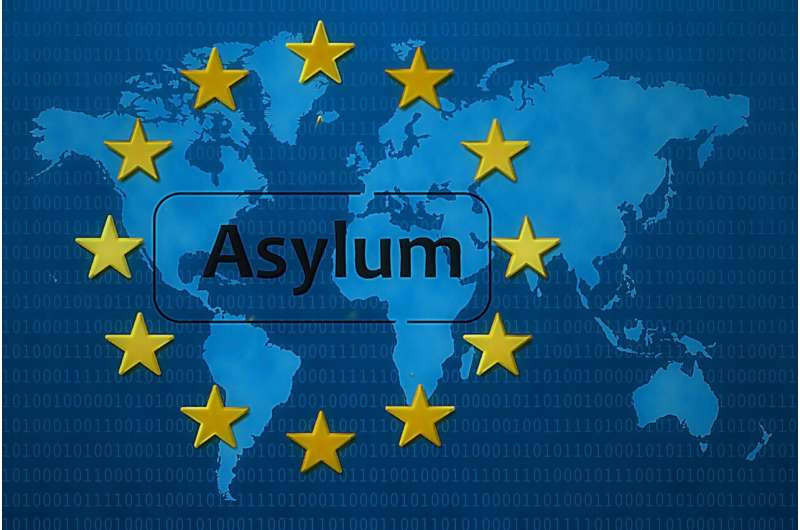Too religious to be queer? Faith and LGBTIQ+ asylum in the UK

Research from a University of Nottingham sociologist has revealed that "homosecular" assumptions can influence and shape the credibility of asylum-claim assessments for LGBTIQ+ claimants who identify with a religious faith.
"Homosecularism" refers to the misguided belief that lesbian, gay, bisexual, transgender, intersex, and queer (LGBTIQ+) people are at odds with religion.
Dr. Diego Garcia Rodriguez, a Research Fellow in the School of Sociology and Social Policy, hopes to conceptualize this new term to bring about new policy implications and change how faith shapes asylum journeys.
The sociologist analyzed the experience of 51 LGBTIQ+ religious people seeking asylum in the U.K. to challenge the assumption that religion and queerness are incompatible, and the were published in the journal Ethnic and Racial Studies
The study offers a new perspective on how religion shapes the experiences of LGBTIQ+ people seeking asylum and highlights how the British Home Office often relies on secular ideas of queerness that fail to recognize the legitimacy of identities rooted in both faith, gender and sexuality.
"This research shows the urgent need for training that moves beyond Western-centric, normative and secular assumptions about queer identities in the U.K. Asylum officers must be equipped to recognize the diverse and coexisting realities of faith and queerness among people seeking asylum, rather than treat them as contradictions," says Dr. Garcia Rodriguez, School of Sociology and Social Policy.
In the U.K., while the sexual orientation of claimants is recorded, gender identity is not. Home Office data reveals that claims based on persecution related to sexual orientation as lesbian, gay, or bisexual accounted for 2% (1,377) of all asylum claims in 2023.
Unlike other people seeking asylum, these individuals face unique challenges due to, among other factors, intersectional stigma, limited support networks, fears of being outed leading to mental health challenges, and housing and detention risks. Given the unique challenges faced by this population, it is critical to examine their lived experiences.
Isaac, a 40-year-old West African Catholic gay man, described his attempt to explain his overlapping identities during an interview with asylum officers. He revealed the skepticism from the interviewer: "I was asked, 'You are a gay man and also a Christian—how is this possible?' I said to him, 'Yes, I was born in a Christian family, and my feelings are a personal thing. I can't throw my personal feelings away.' I was crying sometimes, it's difficult for me to make a decision."
Powerful statements like Isaac's highlight the real-life implications of institutional bias and the need for asylum officers to be trained on cultural, gender and sexual diversity to recognize the co-existence of faith and queerness.
Dr. Garcia Rodriguez explains that while having a religious faith is not automatically a barrier to a successful asylum claim, many LGBTIQ+ applicants reported being questioned by Home Office officials about whether they had renounced or struggled with their faith, reflecting skepticism about the possibility of being both religious and LGBTIQ+.
This scrutiny inevitably makes some asylum seekers feel marginalized, invalidating their gender, sexuality and religious identities. They feel they are not "LGBTIQ+ enough" for the Home Office when expressing a religious identity, while also not being "authentically religious" for faith communities because of their gender and sexuality. This has led to some applicants experiencing depression, anxiety and trauma.
Dr. Garcia Rodriguez advocates for alternative assessment practices that genuinely account for and respect the diverse lived experiences of LGBTIQ+ individuals. Such approaches must move beyond rigid "homosecularist" expectations and instead prioritize empathetic, personalized and contextually sensitive engagements that fully acknowledge the complex and fluid ways in which religious belief and queer identities coexist.
More information: Diego Garcia Rodriguez, You are a gay man, and you're also Christian – how is this possible? Homosecularism, religion and LGBTIQ+ asylum in the UK, Ethnic and Racial Studies (2025).
Journal information: Ethnic and Racial Studies
Provided by University of Nottingham


















